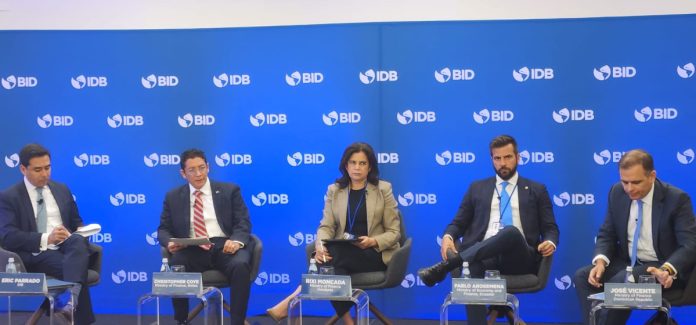By Government Press Office | BELIZE
BELMOPAN, Belize – Christopher Coye, minister of state in the ministry of finance, economic development and Investment, was a panelist at the 57th meeting of the network of central banks and finance ministries within Latin America and the Caribbean, held on April 12, 2023, in Washington DC.
Minister Coye attended at the invitation of the Inter-American Development Bank (IDB). The panelists included the ministers of finance of the Dominican Republic, Ecuador, and Honduras, were asked to share their country’s current fiscal programs underlying and supporting their country’s economic performance and to address development challenges moving forward.
Noting the deep crisis Belize was in at the end of 2020 while being one of the most climate-vulnerable countries in the world, minister Coye highlighted the importance of being laser-focused on the most important goals to be achieved.
Minister Coye reiterated the government’s priority of long-term sustainable human development for Belizeans. He explained that a difficult but necessary exercise in fiscal discipline and political will in the immediate term was required to support that goal. This included expenditure containment across the board, both recurrent and capital expenditures, and renegotiating Belize’s then unsustainable debt burden, which were all accomplished. He also added that the government chose not to increase taxes, but rather to broaden the tax base and enhance compliance. The government also strategically re-opened the country’s key economic sectors – tourism and agriculture – while encouraging economic diversification and investment in the areas of business process outsourcing (BPO) and small business development.
Minister Coye highlighted the results of these efforts in his presentation: Belize grew over 15 percent in 2021 and over 10 percent in 2022, among the fastest rates in Latin America and the Caribbean. The economy diversified as the BPO sector now forms a significant component of our economy in terms of income, foreign exchange, and employment generation. Foreign reserves are at an all-time high, while foreign direct investment is at its highest in over a decade. Belize’s debt-to-GDP ratio has fallen in just two years from 133 to 64 percent as of the end of 2022.
Belize’s fiscal position has improved so much that it was able to quickly recover from the substantial damage and losses caused by hurricane Lisa in November 2022, equivalent to almost 5 percent of GDP with no increase in debt and very little external grant assistance. Most importantly, focusing on human development, even with a minimum wage increase of 50 percent, Belize’s unemployment rate is now at an all-time low of 5 percent. At the same time, the multidimensional poverty index indicates that the poverty rate is now under 36 percent.
Minister Coye noted that there are challenges ahead and, to address these challenges moving forward, said that Belize and its public finances are in an improved position to support public investment towards human development, particularly in areas of education, health, citizen security, physical and digital infrastructure, and energy, while fostering and encouraging private investment and public-private partnerships in a broadening set of economic sectors.
A main challenge, he said, is building climate resilience which remains a tall order for Belize and one that the country cannot accomplish by itself. The minister said this is where the global financial architecture must step in to provide meaningful, proactive, and preventative support by way of grants and highly concessionary financing, even credit enhancements.
Minister Coye ended his remarks by stating that if the government of Belize remains focused, with the support of its development partners, particularly for climate resiliency building, Belize’s development goals are achievable.





